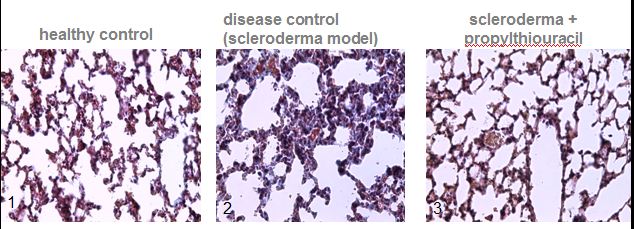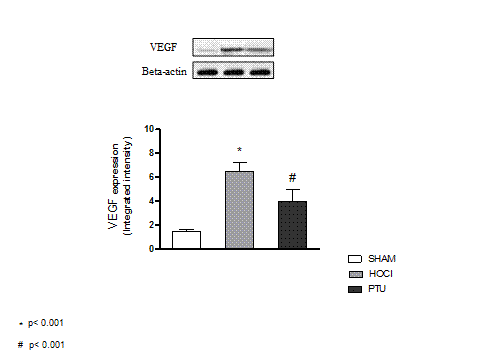Session Information
Title: Systemic Sclerosis, Fibrosing Syndromes and Raynaud’s – Pathogenesis, Animal Models and Genetics
Session Type: Abstract Submissions (ACR)
Background/Purpose: Systemic sclerosis (SSc) is characterized by fibrosis of skin and visceral organs; vascular damage and resultant ischemia; and immunological dysregulation manifested by autoantibodies. Hypothyroidism, induced by either propylthiouracil (PTU) or thyroidectomy, has been shown to induce regression of pulmonary hypertension in the sumatinib/hypoxia rat model involving blockade of vascular endothelial growth factor (VEGF). The aim of this study was therefore to evaluate the effect of PTU in another murine model closer to human SSc, a mouse model of diffuse SSc reported to cause the development of anti-topoisomerase antibodies.
Methods: SSc was induced in BALB/c mice by daily subcutaneous injections of HOCl as an oxidant stress for 6 weeks (Batteux F, Kavian N, Servettaz A. New insights on chemically induced animal models of systemic sclerosis.Curr Opin Rheumatol. 2011 Nov;23(6):511-8). Mice (n=25) were randomized in three arms to treatment with either HOCl (n=10) ;HOCl plus PTU (n=10); or vehicle alone (n=5). PTU treatment was initiated 30 minutes after HOCl subcutaneous injection (12 mg/kg) continuing daily for the 6 weeks. Skin and lung fibrosis were evaluated by histological methods. The severity of fibrosis was assessed using ordinal or nominal scales in both tissues and the results compared nonparametrically.
Results: Injections of HOCl induced both cutaneous and lung fibrosis in BALB/c mice, as reported in the model. Concomitant PTU treatment reduced skin thickness by 77% (images not shown) and reduced pulmonary fibrosis below the level of histological detectability, in effect preventing it entirely in this model. Pulmonary concentrations of VEGF were significantly higher in mice exposed to HOCl (p<0.001) and were reduced by concomitant treatment with PTU (p<0.001). Its downstream mediator ERK (extracellular signal-related kinase) followed the same pattern (images not shown).
Conclusion: PTU-induced hypothyroidism (or the PTU itself, via another mechanism of action not related to hypothyroidism, such as antioxidant effect) reduced significantly the development of fibrosis in the HOCl mouse model of SSc . No confirmatory thyroidectomy experiments were performed in this model, in contrast to those reported in the previous rat model. Further studies are therefore needed to investigate both the roles of thyroid function and reactive oxygen species in scleroderma pathogenesis, including analysis of any direct antioxidant effect of PTU, independent of its effect upon thyroid status.
Disclosure:
G. Bagnato,
None;
A. Bitto,
None;
N. Irrera,
None;
G. Pizzino,
None;
N. Roberts,
None;
M. Cinquegrani,
None;
D. Sangari,
None;
F. Squadrito,
None;
G. Bagnato,
None;
A. Saitta,
None.
« Back to 2012 ACR/ARHP Annual Meeting
ACR Meeting Abstracts - https://acrabstracts.org/abstract/propylthiouracil-reduces-fibrosis-in-chronic-oxidant-stress-mouse-model-of-scleroderma/


